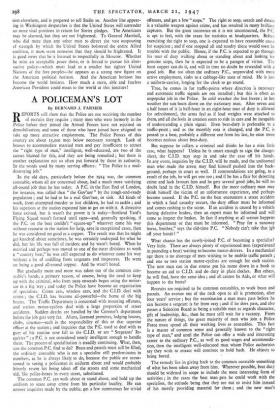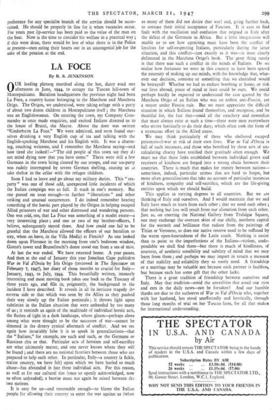A POLICEMAN'S LOT
By BERNARD J. FARMER
REPORTS still show that the Police are not receiving the number of recruits they require ; many men who were formerly in the Police before they joined the Armed Forces have not rejoined on demobilisation; and some of those who have joined have resigned to take up more attractive employment. The Police Forces of this country are about 15,000 men below necessary strength. Lack of houses to accommodate married men and pay insufficient to attract the " right type of man," intelligent, well-educated, are two of the causes blamed for this, and they are being remedied ; but there is another explanation not so often put forward by those in authority. In the words used by many serving officers: " The Police is a soul- destroying job."
In the old days, particularly before the 1914 war, the common constable, whom all are concerned about, had a much more satisfying all-round job than he has today. A P.C. in the East End of London, for instance, was called then " the Guv'nor " by the rough-and-ready population ; and he had to be a real Guv'nor, or sink. All kinds of work, from attempted murder to lost children, he had to tackle ; and his superiors at the station expected him to get on with it. A detective force existed, but it wasn't the power it is today—Scotland Yard's Flying Squad wasn't formed until 1920—and, generally speaking, if the P.C. on the beat couldn't " square-up " whatever came his way without recourse to the starion for help, save in exceptional cases, then he was considered no good as a copper. The result was that he might get knocked about sometimes, he was certainly underpaid for what he did, but his life was full of incident and he wasn't bored. When he married and perhaps was moved to one of the outer divisions to work a " country beat," he was still expected to do whatever came his way without a lot of coddling from sergeants and inspectors. He went on being a good all-round copper. And he wasn't bored.
But gradually more and more was taken out of the common con- stable's hands, a primary reason, of course, being the need to keep up with the criminal, who from 1919 onwards began using the motor- car in a big way ; and today the Police have become an organisation of specialists. Crime cars, wireless cars, and the C.I.D. deal with crime ; the C.I.D. has become all-powerful—the home of the big brains. The Traffic Department is concerned with motoring offences, and station motor-cyclists deal with a large proportion of street accidents. Sudden deaths are handled by the Coroner's department before the job gets very far. Aliens, licensed premises, lodging houses, clubs, cinemas—each is the responsibility of this or that superior officer at the station ; and inquiries that the P.C. used to deal with as part of his routine now fall to the C.I.D. or are " Sergeants' In- quiries " ; a P.C. is not considered nearly intelligent enough to handle them. The process of specialisation is steadily continuing. What, then, can the common P.C. find to do? Beats and patrols must still be filled; the ordinary constable who is not a specialist still predominates in numbers, as he is always likely to do, because the public are accus- tomed to seeing a policeman in uniform about and would probably bitterly resent his being taken off the streets and some mechanical aid, like police-boxes in every street, substituted.
The common P.C. can walk about or stand about, and hold up the uniform to scare away crime from his particular locality. He can answer inquiries made by the public, get. a few summonses for trivial offences, and get a few " stops." The right to stop, search and detain is a valuable weapon against crime, and has resulted in many brilliant captures. But the great insistence on it is not unconnected, the P.C. is apt to feel, with the craze for statistics at headquarters. Before exercising the right to stop, one is expected to have reasonable cause for suspicion ; and if one stopped all and sundry there would soon be trouble with the public. Hence, if the P.C. is expected to go through his tour of duty walking about or standing about and looking for genuine stops, then he is expected to be a paragon of virtue. The born copper can do it, and will in time no doubt be rewarded with a good job. But too often the ordinary P.C., unprovided with more active employment, sinks to a cabbage-like state of mind. He is just a uniform-carrier, longing for the clock to go round.
True, he comes in for traffic-points where direction is necessary and automatic traffic signals are not installed ; but this is often an unpopular job in the Police. In cold weather the feet freeze ; in hot weather the sun beats down on the stationary man. After seven and a half hours of it (a half-hour in an eight-hour tour of duty is allowed for refreshment), the arms feel as if lead weights were attached to them, and all the fools in creation seem to ride in cars and be incapable of understanding a plain signal. Even beat-duty- is preferable to a traffic-point ; and as the monthly rota is changed, and the P.C. is posted to a beat, probably a different one from his last, he once more becomes zealous about beat-duty.
But suppose he collars a criminal and thinks he has a nice little case, what happens? Unless he is smart enough' to sign the charge- sheet, the C.I.D. may step in and take the case off his hands. In any event, inquiries by the C.I.D. will be made, and the uniformed man who made the arrest may find himself pushed into the back- ground, perhaps in court as well. If commendations are going, as a result of the job, he will get one too ; and if he has a flair for detecting crime and luck favours him and he gets several good jobs, he will no doubt land in the C.I.D. himself. But the more ordinary man may -think himself the victim of an unfortunate experience, and perhaps become soured. If the P.C. on the beat encounters a street accident in which a fatal casualty occurs, the duty officer must be informed and comes rushing to the scene. If an accident is caused by a vehicle having defective brakes, then an expert must be informed and will come to inspect the brakes. In fact if anything at all serious happens this department or that must be informed. " Pray for a runaway horse, brother," says the old-time P.C. "Nobody can't take that job off your hands! "
What chance has the newly-joined P.C. of becoming a specialist? Very little. There are always plenty of experienced men (experienced in pounding a beat) waiting to become motor-drivers. In a mechanical age there is no shortage of men wishing to be mobile traffic patrols ; and one or two station motor-cyclists are enough for each station. The new man can in due course put his name down in a book to become an aid to C.I.D. and do duty in plain Clothes. But others, he will find, have the same idea ; and all cannot be Aids, or what will happen to the beats?
Recruits are required to be common constables, to work beats and patrols. An avenue out of the ruck open to all is promotion, after four years' service ; but the examination a man must pass before he can become a sergeant is far from easy ; and if he does pass, and also passes a Selection Board as being a suitable min as regards character, gift of leadership, &c., then he must still wait for a vacancy. From the nature of things, the great majority of men who join a Police Force must spend all their working lives as constables. This fact is a matter of common sense and generally known to the " right type of man," and until the Police can offer a wide and interesting career to the ordinary P.C., as well as good wages and accommoda- tion, then the intelligent well-educated man whom Police authorities say they wish to attract will continue to hold back. He objects to being bored.
The remedy lies in giving back to the common constable something of what has been taken away from him. Wherever possible, beat duty should be widened in scope to include the most interesting form of activities ; in the cases the beat man gets he could work with the specialists, the attitude being that they are out to assist him instead of his merely providing material for them ; and the new man's preference for any specialist branch of the service should be ascer- tained. He should be properly in line for it when vacancies occur. For years past lip-service has been paid to the value of the man on the beat. Now is the time to consider his welfare in a practical way ; if this were done, there would be less of what there is in the Police at present—men eating their hearts out in an uncongenial job for the sake of the pension at the end.



































 Previous page
Previous page